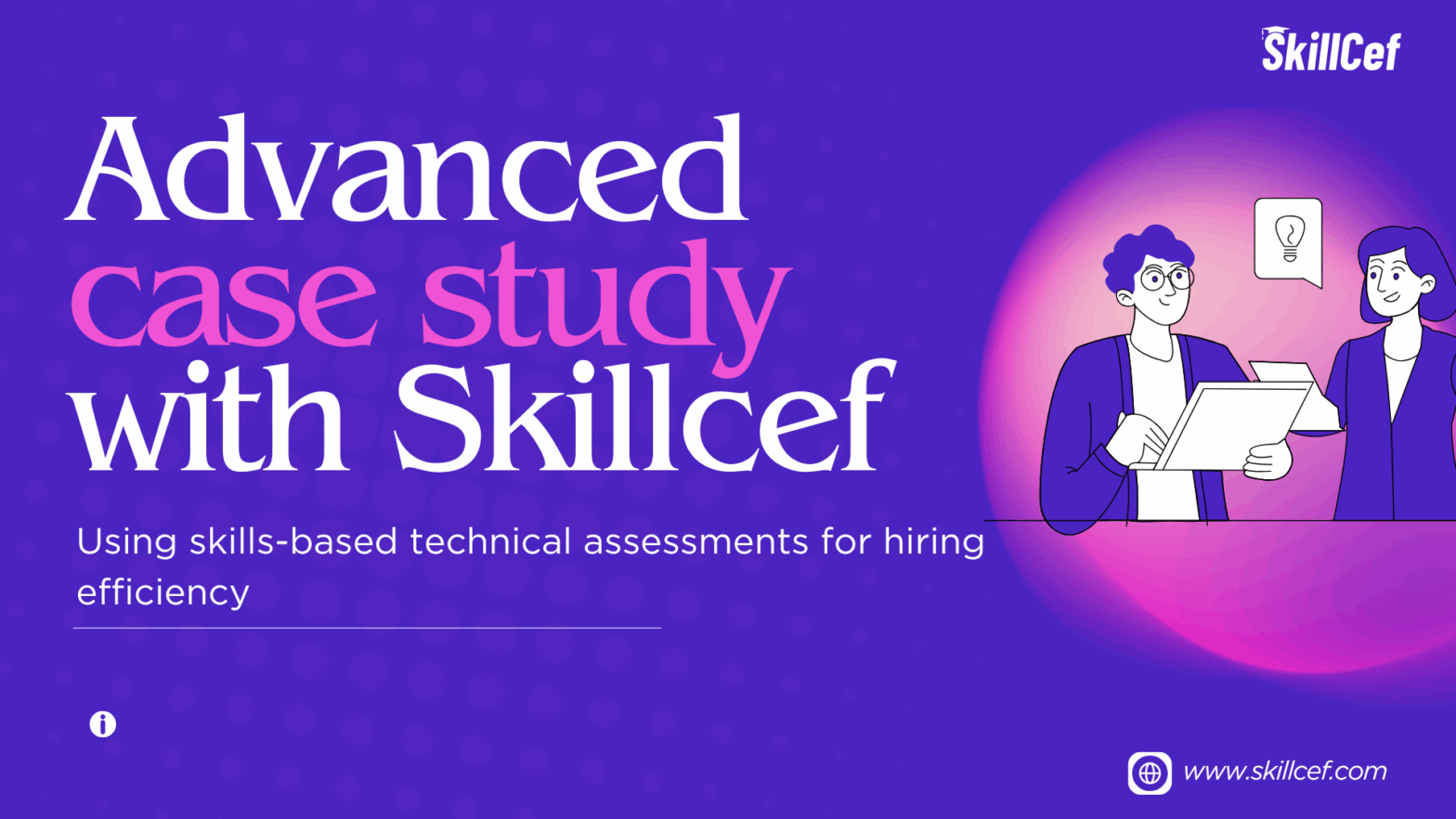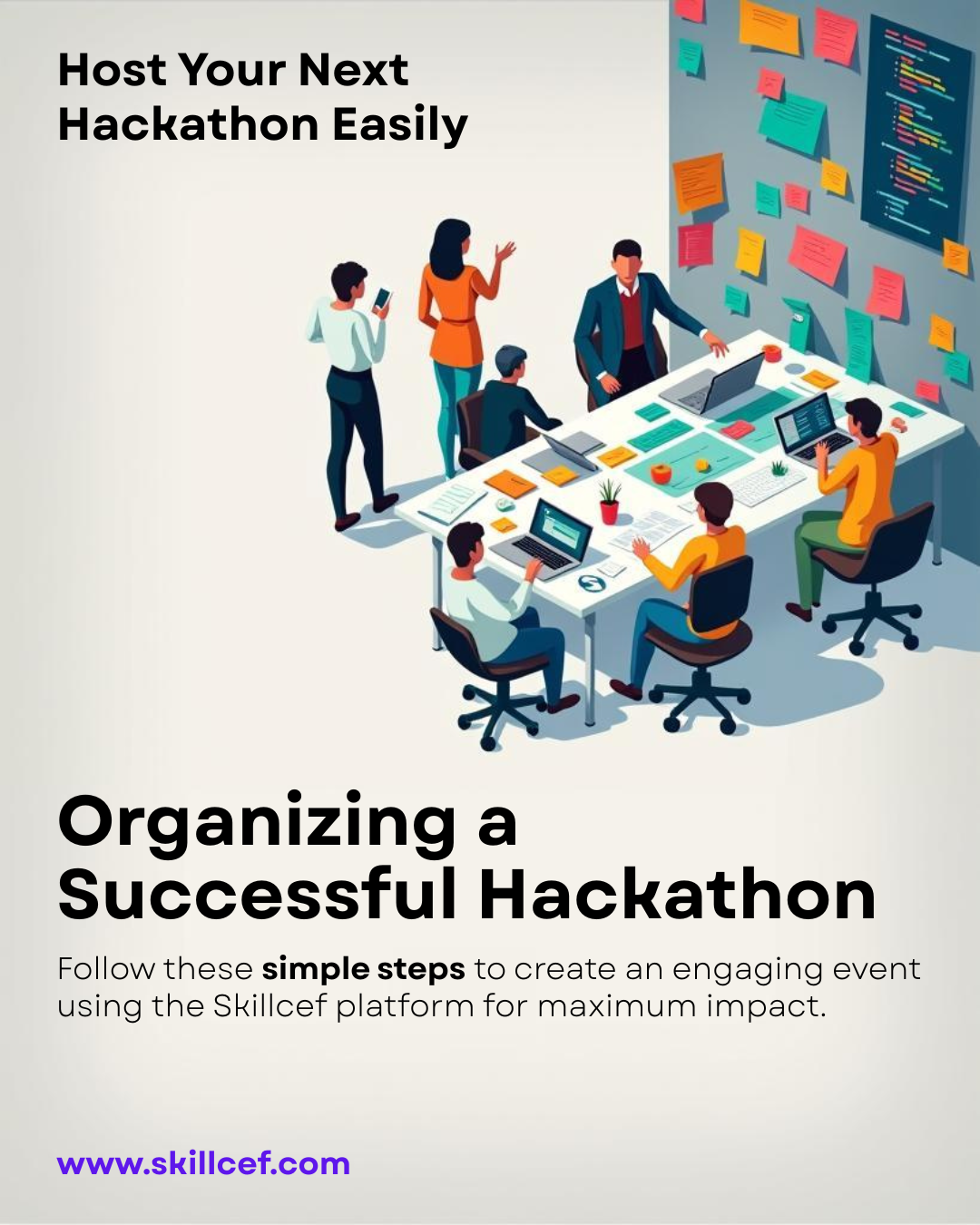
Assessments for hiring efficiency – Advanced case study with Skillcef
Hiring efficiency can be significantly improved by utilizing various assessment methods throughout the recruitment process. These assessments help identify qualified candidates, streamline the selection process, and ultimately reduce time-to-hire and cost-per-hire while improving the quality of hires. Key assessment types include cognitive ability tests, personality assessments, job knowledge tests, skills tests, and situational judgment tests.
This blog post will delve into the limitations of old hiring methods, hint more on the power of skills-based technical assessments, and, through an advanced case study example, demonstrate how platforms like Skillcef are leading the charge in transforming talent acquisition for modern recruitment.
The Shortfalls of Traditional Hiring Methods in Tech
For decades, the resume has been the gatekeeper of career opportunities. Yet, for technical roles, its limitations are glaring.
Why resumes fail to capture technical competence: Resumes offer a snapshot of past roles and educational achievements, but they often struggle to provide a true measure of a candidate’s practical, job-specific technical skills. They tell you “what a candidate wants you to hear” rather than what they can actually do. This can lead to subjective interpretations and a lack of objective evaluation.
The high cost of bad technical hires: A mis-hire in a technical role can be incredibly expensive, impacting project timelines, team morale, and overall productivity. Traditional methods, which are prone to subjective bias, increase this risk.
Time inefficiencies in conventional interview processes: The traditional hiring process, often reliant on multiple rounds of interviews, can be incredibly time-consuming. Companies report needing fewer interviews when using AI assessments, significantly cutting down hiring time. One company even saved 2,200 hours of interview time over 90 days, akin to gaining time to launch a new product.
Subjective bias in technical evaluation: Without standardized, data-driven assessments, hiring decisions can be heavily influenced by personal feelings or unconscious biases. This undermines fairness and can lead to missing out on highly capable candidates who might not “interview well” but possess the necessary skills. AI-powered systems, by contrast, aim to provide consistent, equal, and fair processes for every candidate.
Understanding Skills-Based Technical Assessments
The answer lies in a more scientific, data-driven approach: skills-based technical assessments. These assessments focus on evaluating a person’s actual abilities rather than solely relying on their background or job titles.
- Core principles of objective skills measurement: Skills-based assessments provide a structured and objective way to evaluate capabilities against specific job requirements, ensuring alignment between skills and role expectations. They leverage data to score and rank individuals based on their performance on skill tests and practice job tasks, leading to more confident decisions.
- Types of technical assessments available today: Modern platforms offer a wide array of technical assessments, including coding challenges, problem-solving tasks, real-world questions, and theoretical questions tailored to specific technical requirements. These can cover everything from programming languages (20+ languages) and cognitive ability to personality, culture fit, and role-specific scenarios.
- How Skillcef’s assessment platform differs from competitors: Skillcef positions itself as an AI-driven platform for “Your Journey to Success”. It aims to empower growth for all – students, professionals, and organizations – by providing personalized learning paths and connecting users with job opportunities through AI. Unlike general assessment tools, Skillcef integrates learning, assessment, and career advancement within a single hub. It offers:
- AI-Powered Learning with personalized course recommendations.
- Real-World Assessments to test skills and track progress.
- Interactive Learning through workshops and hackathons.
- A Skillcef Hub where users can code in real-time in a browser-based IDE, take industry-relevant assessments, and find jobs.
- For businesses, Skillcef offers access to pre-assessed candidates, custom learning solutions, and data-driven insights into learner performance. It also provides whitelabeling services for customized skill development platforms.
- Key metrics that predict on-the-job performance: These platforms provide detailed performance analysis and progress tracking. They measure how well candidates perform tasks that reflect the skills of the job, providing a detailed report for confident, data-backed decisions. Predictive analytics is used to identify top performers early, moving beyond just raw scores.
- Balancing technical evaluation with cultural fit: While technical skills are paramount, modern assessment platforms also include evaluations for soft skills like communication, critical thinking, and personality traits to ensure team compatibility and job satisfaction. This holistic approach ensures a better cultural fit and reduced turnover rates.
Skillcef Case Study: Global Tech Firm Transformation (An Advanced Example)
Imagine a hypothetical scenario: a global tech firm, facing immense pressure to scale its engineering teams while battling high attrition and lengthy hiring cycles, decided to overhaul its talent acquisition strategy. Their traditional process involved endless resume reviews and multiple rounds of subjective interviews, leading to slow hires and occasional mis-hires.
Taking advantage of Skillcef’s comprehensive AI-driven platform, the firm embarked on a “skills-first transformation”. agenda.
- Company background and initial hiring challenges: This firm, like many, struggled with the sheer volume of applications, the lack of standardized technical evaluation, and the inability to quickly identify candidates with niche AI and emerging tech skills.
- Assessment implementation strategy and timeline: The firm partnered with Skillcef to implement a phased approach. First, they used Skillcef’s AI to build a precise, dynamic skills framework tailored to their engineering roles, leveraging Skillcef’s ability to structure and enhance talent capabilities. They utilized Skillcef’s comprehensive library of ready-to-use tests and custom assessment capabilities. For critical roles, Skillcef’s AI-EnglishPro™ was used to ensure strong English communication skills, a global requirement.
- Customization of technical challenges to match real job requirements: Instead of generic tests, the firm utilized Skillcef’s real-time coding environment and customized challenges that mirrored actual project scenarios, ensuring that assessments were highly relevant to daily tasks. This included developing emerging and in-demand skills like AI prompt engineering, which Skillcef’s platform supports.
- Data collection and analysis methodology: Skillcef’s platform provided AI-driven insights and data analytics. This allowed the firm to track performance, bridge employee skill gaps, and make informed talent decisions. Multi-channel skills validation, combining self-ratings, manager ratings, and assessment results, gave a holistic view of skills.
Measurable Results and ROI in Hiring
While this is a hypothetical example, the results observed in similar real-world applications of skills-based hiring platforms provide a strong indication of the potential impact:
- 40% reduction in time-to-hire metrics: By streamlining screening and eliminating unnecessary interview rounds, companies have reported significant reductions in hiring time. One company noted cutting hiring time by months.
- Improved quality of hire based on 6-month performance reviews: Focusing on real skills leads to better job performance and reduced turnover rates. Companies report reducing mis-hires by as much as 90%.
III. Cost savings from decreased turnover: Higher job satisfaction and better cultural fit, fostered by accurate skill matching, contribute to lower employee turnover.
- Team productivity increases with better-matched technical skills: When employees are precisely matched to roles based on their skills, teams become more efficient and productive.
- Hiring manager satisfaction scores: Platforms that simplify decision-making and provide clear insights often lead to higher satisfaction among hiring managers.
Best Practices for Implementing Technical Assessments
To truly unlock the power of skills-based assessments, a strategic approach is essential:
- Creating role-specific assessment frameworks: Tailor assessments to evaluate the specific skills and knowledge required for each unique role, moving beyond generic tests.
- Integrating assessments into existing hiring workflows: Seamlessly connect assessment platforms with existing HR systems (HCM) to manage talent management processes in one place.
- Providing candidate-friendly assessment experiences: A positive candidate experience, with clear branding, personalized feedback, and efficient scheduling, is crucial for attracting top talent. Many platforms boast high candidate satisfaction ratings.
- Using assessment data for continuous improvement: Leverage the rich data generated by assessments to identify trends, understand skill gaps, and continuously refine hiring strategies and learning programs.
Your Partner in a Skills-First Future
The future of work is undeniably skills-first, and navigating this transformation requires robust, intelligent tools. Skillcef is at the forefront of this shift, dedicated to making your journey to success a reality.
At its core, Skillcef’s mission is to empower growth for all—whether you’re a student building foundational skills, a professional aiming to advance your career, or an organization striving to recruit and develop top talent. We understand that identifying the right skills and finding qualified talent are tough challenges.
Our solution? Skillcef harnesses the power of AI to provide personalized learning paths and connect users directly with job opportunities. For individuals, this means AI-powered learning with personalized recommendations, skill development paths to close gaps, real-world assessments to track progress, and interactive workshops and hackathons for hands-on experience, all leading to career advancement through certifications and employer connections.
Skillcef is your comprehensive Hub for Learning, Testing & Career Growth, where you can code in real-time, test your skills with industry-relevant assessments, and find your next job. We are committed to bridging the gap between theoretical knowledge and real-world applications, building a vibrant community of industry-ready professionals, and genuinely caring about the success of our users, as echoed by our satisfied learners and partners.
Questions People Also Ask – Frequently Asked Questions (FAQs)
– There are many potential metrics to consider to measure hiring efficiency, including the following:
- Time to Fill.
- Time to Hire.
- Application Completion Rate.
- Open Positions.
- Candidate / New Employee Experience.
- Cost to Hire.
- Offer Acceptance Rate.
- Quality of Hire.
What is hiring assessment?
– Assessment tests for jobs, also known as pre-employment tests, help hiring managers determine whether a candidate has the skills, work style, knowledge or personality to succeed in a job. Companies use assessment tests to make good hiring decisions, often during the early parts of the interview process.
What is the formula for hiring efficiency?
– Recruitment funnel effectiveness.
It measures the effectiveness of all steps in the recruitment funnel and is calculated by dividing the number of candidates who successfully completed the process by the number of candidates who initiated the process.
What are assessment tests?
– Assessment testing is the process of evaluating an individual’s skills, abilities, knowledge, or other characteristics through the use of tests or other assessment tools. It is often used in the hiring process to evaluate candidates for a particular job or role.


